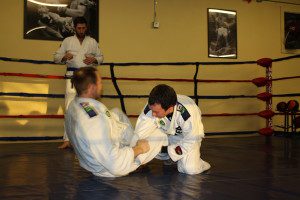What Makes BJJ Good for Self-Defense?
Imagine that an intoxicated individual makes their way up to you on the street, looking for a confrontation. What should you do? Should you punch them first? Should you wait until they throw the first punch and then react accordingly? These questions, plus more, can all be answered once you start taking BJJ classes. What makes BJJ good for self-defense? In short, it’s the ultimate self-defense martial art for dealing with opponents who are bigger, stronger, or more experience in standup fighting.

What Makes BJJ Good for Self-Defense?
Most People Won’t Be Comfortable on the Ground
Remember this golden rule regarding BJJ: most individuals on the street are going to feel like a fish out of water once you’ve taken them to the ground. From here, a good grappler can end the fight quite quickly by putting in a tight submission. Even if someone is very experienced in say, boxing or kickboxing, they’ll still have all of their power taken away once you use your grappling techniques against them. Because of this, it could be said that BJJ is the best martial art for every kind of self-defense situation, minus those that include a weapon.
Learn More About Portland Jiu Jitsu!
You Choose How You Want to End the Fight
Are you scared that if you let your opponent up after the fight that he’s going to continue trying to hit you? If so, a simple neck choke can cause an opponent to temporarily pass out, giving you time to get your distance before they wake up. If you feel like the situation is exceptionally life-threatening, you can choose to break an opponent’s arm or ankle, rendering them unable to continue fighting you. Granted, not all self-defense situations need to go to this extreme, but it’s always better to be prepared should something like this ever happen.
Portland Jiu Jitsu Technique: Arm Bar from Cross Choke with Professor Jeff Patterson
Click Here to See More Portland Jiu Jitsu Videos
Experienced Grapplers, Beware!
Unless the self-defense is life-threatening, as we mentioned earlier, you probably should avoid breaking your opponent’s arm or leg. The reason why is because expensive lawsuits can arise from this, and depending on how dragged out the case becomes, you could end up paying a bunch of money in court and attorney fees.

What Makes BJJ Good for Self-Defense?
So when you’re faced with a situation to walk away or fight, it’s almost always better to walk away. But if you’re forced to fight, try to search for a choke since those can be recovered from very easily. What makes BJJ good for self-defense? The answer lies in the leverage and unique diversity of moves and defensive techniques that this martial art provides.



